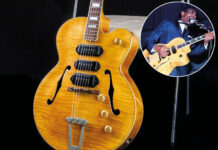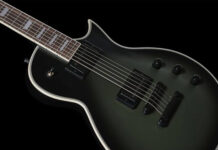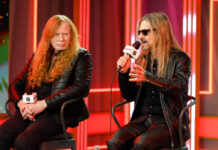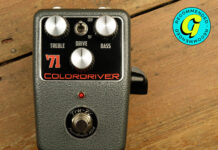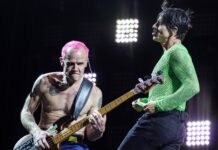
How MJ Lenderman embraced Gibson guitars and exploding guitar solos to make the indie-rock record of the year
Broadly speaking, MJ Lenderman’s solos conform to the usual dog-eared blueprints: it’s two thirds of the way through the song, the chorus has just slipped out the back, it’s the obvious play. But that familiarity doesn’t mean a thing when they actually hit, climbing out of the speakers with the sort of elemental power that catches you entirely off guard. “It’s kind of an explosion,” he says from his hotel room during a brief stopover in London, and the dude’s not wrong.
READ MORE: Wednesday on Rat Saw God and the importance of keeping your feet on the ground
Lenderman’s new record Manning Fireworks is studded with moments like these. It rocks. But it rocks in a particular way. There are songs here that sound like instant classics while, in the same movement, using a well-loved flannel shirt to put out anything resembling rockstar grandstanding. When the time is right to go big – see the solos of Wristwatch, On My Knees and Rudolph, or the chorus of She’s Leaving You – it’s like something has been uncorked. All of a sudden Lenderman’s music is about volume and melody and feeling. As a result, he rocks like Neil Young rocks. “I guess,” is basically all he has to say about that, which is perfect.
To this point Lenderman’s acclaimed solo records have almost run in parallel to his work as a guitarist. Last spring he played on the superlative Rat Saw God, his second LP as a member of Wednesday, the genre-defying band out of his hometown of Asheville, North Carolina fronted by Karly Hartzman. Earlier this year, meanwhile, he backed Katie Crutchfield on Waxahatchee’s superb Tigers Blood, including their mesmerising duet Right Back To It.
All the while, he’s been learning. “I guess I’ve had more time with Wednesday, building songs together,” Lenderman observes. “I think it’s tightened up how I think of parts. The way Katie records is more similar to what I normally do. She has the bones and she encouraged me to be me, to do what I wanted to do.”
Image: Sam Resetarits
Big Bang
By following in the wake of these records, though, Manning Fireworks feels like it’s carrying around a sense of expectation, which is new and a little daunting. Lenderman – who goes by Jake day to day – lives in a small town. When he talks about himself it’s in the deliberate, almost reluctant cadence of someone who’s much happier making music with his friends than he is discussing it with randos. He’s not here to make himself the centre of something, but his songs have done that for him anyway. In response, he’s checked out of any outside noise. “The main thing was getting offline,” he says. “I stopped running my socials. At this point, once you release something it’s not mine to worry about anymore. As far as the songs go, I was just trying to stay true to what I’ve been doing.”
Manning Fireworks does a remarkable job of that while still representing growth. Lenderman’s earlier music – this is his fourth album, following up the pandemic sleeper hit Boat Songs – takes in lo-fi indie-rock, fuzz-heavy spectral psych and chooglin’ barroom bullshitting about sports. Here he wisely splits the difference between those poles, cutting away some of the woolier elements of his sound to deliver something that’s muscular without ever losing sight of the low-stakes, conversational heart of his writing.
That balancing act is reflected by lyrics that conjure richly drawn, lived-in situations from a few clipped phrases. Thanks to the weight and intent of the songs, any bruises left by Lenderman’s words rapidly deepen, bringing out a sort of hard-won clarity and sad-sack poignancy. See the way Joker Lips chases the line “Please don’t laugh / only half of what I said was a joke” with the couplet “Kahlua shooter / DUI scooter”.
“In the past it was more loose,” Lenderman says. “I didn’t really think of each instrument having a part, necessarily, outside of the main chords and structure. Every time you played the song, it could be a little bit different. This time, though, I was thinking about hooks. I was more excited by direct melodies.”
Bare Bones
Equally, there was a fairly bare-bones approach to personnel while recording went on at Drop of Sun studios in Asheville. Lenderman’s fingerprints are all over the record – in addition to guitar and vocals he’s credited with handling bass, drums, organ and ‘drone’ – while a few friends stopped by to add their two cents. Among them, producer Alex Farrar plays drums, mellotron and piano. Hartzman sings on six of the record’s nine songs, while Wednesday’s lap steel player Xandy Chelmis sits in on two. Shane McCord, another Asheville musician, contributes clarinet to the skipping You Don’t Know The Shape I’m In, leaving it with an air of Andy Shauf’s recent character-driven LPs.
Given that Lenderman put out Live and Loose! last year, a record that celebrated both his chemistry with his group (a revolving cast of musicians known as ‘the Wind’) and also the way songs grow extra legs when they’re being performed in front of packed rooms, this insularity seems like a bit of a reversion to type.
In fact, as the inclusion of a shit-kicking version of Rudolph on the live LP suggested, work on Manning Fireworks predates that uniformly fun set by quite a while. “It’s just a different zone, I guess,” Lenderman says. “I like the fact that I’m able to do stuff by myself. When we do the live shows it’s a different thing. It was always the plan to do it by myself.”
Reconnecting with Farrar, who also helmed Rat Saw God, meant that Lenderman could slip into a routine that he knew would work. “Alex is really good at recording guitars – I trust his vision, we’re on the same page,” he says. “It’s probably a lot of the same gear as the Wednesday album,” he continues, noting a mix of Hiwatts and Marshalls on the amp front, along with an AC-30 that eventually elbowed its way in.
“I got that at some point along the line,” Lenderman says. “I let the tech at the studio [Nathan Culberson] gut it. He changed out all the speakers and the tubes to make it more like a vintage AC-30. We used that a good bit on the record.”
Image: Karly Hartzman
Solid Ground
While tracking Rat Saw God, Lenderman introduced an SG to his arsenal, backing up the Jazzmaster that has long been his go-to. That dynamic has also carried over here, with both guitars threaded throughout Manning Fireworks alongside some studio finds. “On Joker Lips we used an aluminium-neck guitar for the lead line,” Lenderman says. “Everybody thinks it’s a pedal steel, but that is played on guitar through a vintage Ibanez Phaser from the 70s.”
Live, though, the balance has tipped into Fender country again. When it comes to playing these songs on the road, the Jazzmaster is back in the driver’s seat alongside a Blues Deluxe fitted with a Warehouse speaker and a simple board comprising a Death By Audio Interstellar Overdriver, a Cry Baby and a Boss DD-7. “My guitar’s always tuned down a step, I tend to capo a lot,” Lenderman says. “But a lot of the songs on this record are non-capo and, first position, tuned down a full step. I’ve found that with the longer neck, there’s more space that the strings cover and it stays in tune a lot better than the SG does when I’m tuned down low like that.”
When he plays with Wednesday the Blues Deluxe gets extra heft from the AC-30, partly because of the shoegaze craziness that comes with the job but mainly in service of “just, like, being loud.” Wherever you go with Lenderman’s music – and on Manning Fireworks every rager is chased by something resembling yacht-rock or scratchy alt-folk – it does always seem to come back to volume eventually. “I got into Dinosaur Jr at a pretty young age,” he says, and the penny drops. “My dad had the Farm CD. That was the first time I heard them. I thought they were a way younger band; it blew my mind when I saw a picture of them. I was maybe nine or ten.”
Around the same time, Lenderman got his first guitar: a sunburst Squier Strat that he covered with stickers and silver Sharpie. “It’s hanging up in my childhood bedroom,” he says. “It looks pretty dumb.” Later, along with that eardrum-rearranging noise courtesy of J Mascis, Derek Trucks became a heavy influence as he learned what sort of player he might become. “He’s one of the reasons I don’t play with a pick,” Lenderman adds. Soon, he started performing at ice cream shops and restaurants in Asheville as part of an after-school club. “Nobody really wanted us to be playing,” he recalls. “We had six or seven guitar players at any given time.”
It wasn’t long until he was pitching up with his own bands at local haunts such as Static Age Records, while catching touring indie bands at UNC Asheville, the college in this particular college town. Reflecting on home, and what’s kept him there, Lenderman observes that he’s about to be away a lot. He’s between places right now, which might be for the best given the heavy touring that’s about to come down the pike, but he’s determined to protect the world that has sustained him to this point. There won’t be another Manning Fireworks, you sense, if all anyone does is demand another Manning Fireworks. “We still say no to stuff, and we have boundaries around time off,” Lenderman says. “We’re trying to keep it sacred, I guess.”
MJ Lenderman’s Manning Fireworks is out now, tickets for his 2025 UK tour are on sale now.
The post How MJ Lenderman embraced Gibson guitars and exploding guitar solos to make the indie-rock record of the year appeared first on Guitar.com | All Things Guitar.
Source: www.guitar-bass.net


